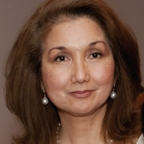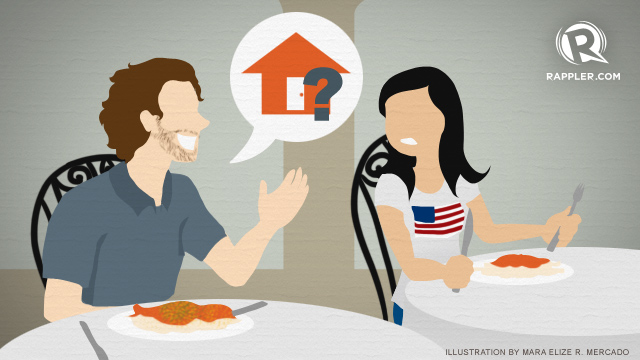SUMMARY
This is AI generated summarization, which may have errors. For context, always refer to the full article.

CALIFORNIA, USA – It sounds like a simple question, innocuous and straightforward. That’s what I thought 30 years ago before I decided to sink my roots in this country.
You hear it everywhere, from everyone. In social events, in church and school. On the job. Out in the streets. From new acquaintances. Even strangers: Where are you from?
The default answer would be the country of your birth, or so I thought. And what could possibly be so egregious about someone expressing interest in your origin?
I was asked the question recently at a restaurant in Barcelona. By a more than charming total stranger who happened to sit at the table with his gorgeous date close to ours.
If the Bradley Cooper lookalike had popped the query soon as we had settled into our spot, I might have given him a short look of the finger. But there’s more to the story.
We had chosen this restaurant to escape the mob at the city’s tourist central. Pray don’t let us venture where diners twang or cringe at the sight of fish heads, we thought to ourselves. This was the eve of our flight back to California and we hoped to savor distance from home before facing the daily grind. Well surprise.

What would be taking all of Bradley Cooper’s concentration but fideua that Catalan version of pasta, cut up in thirds, toasted at the top and served in a paella pan. Clearly he caught me taking a not-so-subtle peek because he suddenly put down his fork and proceeded to scoop a mound of his dinner onto the bread plate, turned to me with a smile and said, “Here, try it.”
Naturally I declined, saying we were merely curious about the portion, wanting to have room for all the tapas we had been dreaming about all day.
But he was insistent and set the plate before us to politely – graciously – thank him for the sample.
“They make it on the salty side, don’t they,” I couldn’t help myself from critiquing, thus reopening the conversation.
“They do,” agreed Bradley, and there we bonded.
“I’ll order the same but will tell them to go easy on the salt,” I decided aloud. Good idea, Bradley Cooper replied, not verbally as his mouth was full, but with assent in his GQ-cover face.
I thought we would all gravitate behind the unseen wall around our private space when he turned to me again and asked that question. To which I did not even have to think, responding in the way I have since the mid-1980s.
“The Bay Area. San Francisco. Actually Daly City.”
I’m not sure if that was the answer he was looking for. Or what exactly he needed to know. Because depending on where you are and who is asking, the question is fraught. It could be code for: You’re different. How come you talk like that? You’re not from here. Otherwise why even ask? Particularly in the United States, where “from here” or “American” often refers to a specific population, while others are identified by their ethnicity, even if their entire clan was born here. That’s not an issue unless you want to be recognized as no less American whatever your origin.
A colleague explained how she resented the question, from which she inferred a veiled if unintended insult. The interrogative is actually a declarative , she opined, for a newbie, a non-equal. It assumed that the object of the question is an outsider.
That’s why the immigrant from Rizal was quick to reply “Berkeley,” her then-address, to that poser. Then she just as quickly returns the question to compel the other into her shoes. Can’t indulge their assumption that we’re not “from here” or “their country,” she said.
Where did Bradley think we were from? Was it strange that I spoke Spanish to the server? Did I remind him of someone?
When Bradley Cooper’s date heard my reply, she paused from peeling her prawns ala plancha and exclaimed: “We’re all Americans here!”
We were in Europe “from” the same continent – the New Yorkers to our left, the Mid-westerns on the other side, and the Southern Californians further down.
I fired back the question at Bradley’s date and she pointed to herself as “from Colorado” and to him as “from Florida.”
When I said the prawn heads were the tastiest, she demurred, concluding, “Because you’re Asian.” Whatever did she mean? Did she also assume I eat rice? (I don’t.)
Bradley concurred that prawn heads were his favorite too, because he was “part-Asian,” volunteering that he had been living for decades in Thailand. “But I’m originally from New York,” he made sure to add.
“Citizen of the world,” I praised him, corking that subject. – Rappler.com
Cherie Querol Moreno identifies as a Filipino American, two cultures in one and not two halves of one. She is a commissioner with the San Mateo County Commission on Aging appointed to advise the County Board of Supervisors on issues affecting older Americans. She is founder and executive director of ALLICE Kumares & Kumpares, an all-volunteer nonprofit staging free violence prevention presentations in the community. A longtime journalist, she is executive editor of Philippine News. Rappler is publishing this essay with her permission.
#BalikBayan is a project that aims to harness and engage Filipinos all over the world to collectively rediscover and redefine Filipino identity.
.
Add a comment
How does this make you feel?
There are no comments yet. Add your comment to start the conversation.